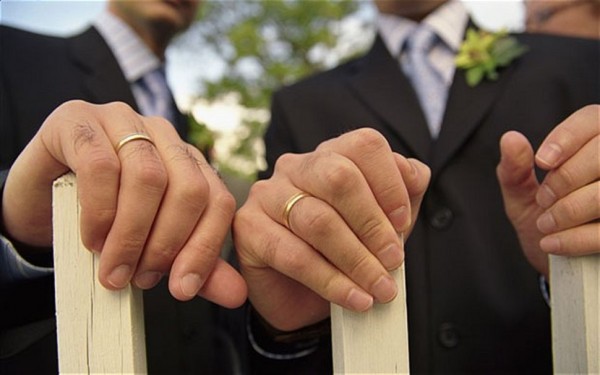With the recent decision by the U.S. Supreme Court to impose the legalization of same-sex marriage on all of the States, many people wonder how this will affect the Church. The answer is, of course, quite simple: it does not affect the Church at all in any way whatsoever. The Church has lived in the Roman Empire, the Byzantine Empire, the Ottoman Empire, the Communist Empire, the Capitalist Empire, various democracies, monarchies, aristocracies, oligarchies, etc. and kept the truth she received from God unchanged. The Church has lived through ages of Roman immorality, Byzantine Christian state officialdom, the Middle Ages in Europe, the Muslim invasion of Palestine, the humanism of the Renaissance, the Soviet attempts to build communism, the American separation of Church and State, and many other ages and circumstances, and she still kept her truth because she received it from God. In other words, it does not matter what any given society in any given age chooses to “celebrate”–gay pride or burkas, cannabis or ecstasy, pornography or abortion, alcoholism or prohibition–the Church does not receive her truth from social movements or Supreme Court decisions. The Church receives her truth from God and that is why she is not blown in this direction or that by various winds or tossed by different currents.
Is homosexuality anything new? No. As far as we know, it has been around for a very long time. For the purposes of the teaching of the Church, the Apostle Paul mentioned homosexuality in his epistles in the first century, and various mentions of it can be found in the writings of the Fathers of the Church. The recent decision of the U.S. Supreme Court does nothing to change the teaching of the Church (nor is it meant to).
Are homosexuals born homosexual? I do not know. This may be something for scientists to figure out. Ultimately, whether homosexuals are born that way or become that way through upbringing or in some other way–this makes little difference to the teaching of the Church. Scientists tell us that sociopaths are born that way and that murderers have genes that predispose them to murder. They also tell us that family members of sex offenders are five times more likely to commit sex offences. And it does not take a geneticist to notice that some people are born predisposed to anger problems, and others–to addictions. And yet we do not “celebrate” any of those behaviors, nor does research in genetics have any effect on what the Church considers a sin or not. This is not, of course, to propose that homosexuality is in any way similar to sociopathy, or murder, or addictions, but only to say that “being born” a certain way is neither here nor there as far as the Church is concerned.
Does the Church have a position on what marriage is? Yes, but it is not derived from the opinions of the U.S. Supreme Court any more than it is derived from the Sharia law or the ideas of the Hippie movement.
Does the Church have an opinion on homosexuality? Yes, but it does not depend on whether homosexuality is legal or is considered a crime by the State.
Will the Church be forced to marry homosexuals? No. It is true that marriages officiated by Orthodox priests are currently recognized by the State as legal civil marriages, and this makes priests de facto agents of the State. But if the State decides to force them to perform homosexual marriages, the Church will simply get out of the business of performing civil marriages altogether. This is the case in Russia and has been for nearly a century. The State issues official civil papers to whom it wishes in accordance with civil laws, and the Church blesses Christian marriages in accordance with the truth she received from God. Will our tax-exempt status be at stake? Maybe, but this is insignificant compared to the kinds of persecution that Christians endured over the course of history. We have prevailed, and even the gates of hell do not stand a chance against the Church.
Civil laws, social fads, public opinions, movements, debates, philosophical or political theories, governments of this world–none of that matters in the kingdom of God because God’s kingdom is not of this world. And this is the kingdom to which the Church belongs. Christians are citizens of God’s kingdom. We observe the civil laws of whichever state we happen to live in at this time, but we obey God’s laws and live according to Christ’s commandments.
The U.S. Supreme Court says that states have to marry homosexuals regardless of what the people in those states think about it. The Supreme Court also says that pornography is legal, and that abortion is legal, and that greed is legal, and that adultery is perfectly legal as well. But the Church is not worried about what is legal and what is not. The Church is focused on what is salvific. The U.S. Supreme Court will not tell us how to be saved, how to live with God, and what the laws are in God’s eternal kingdom, but the Church will tell us those things.
Having said this, I must admit that there are some questions to which I still have not found good answers. For example, if a young man and a young woman come to a priest and say: “We love each other and want to be together,” the priest is likely to say: “Great! Get married! May God bless you!” The assumption is (at least in the 21st century in the U.S.) that it is precisely this “thing” the young people call “love” that lays the foundation for a marriage. Of course, there are any number of qualifiers–the couple’s maturity, stability, commitment, etc., but it is this initial “love” that seems to get the Church “ball” rolling. We then propose that this same “love” expressed in commitment, care, support, self-sacrifice, and other acts is what makes a marriage, at least in part, an icon of Christ and the Church. Finally, while we pray for the young couple to have children, we do not insist on it: we will marry people who are barren due to medical conditions, and a couple of 50-year-olds who are not planning on having babies at that stage in their lives, and also two people who want to live as “brother and sister” and to preserve their virginity. Thus, as the Church, we state that marriage is not about procreation at all, but about the self-sacrificial love of two people for one another–however we choose to define love.
Now imagine that two young women come to a priest and say the exact same thing: “We love each other and want to be together.” Suddenly, the “love” does not matter, commitment does not matter, self-sacrifice does not matter, mutual support does not matter. The only thing that seems to matter is that their relationship is unnatural, and by this we mean their sexual relationship, of course, since neither commitment, nor self-sacrifice, nor mutual support is what we are talking about when we use the word ‘unnatural.’ So, is it about sex then? Because if it is, we need to talk about it, instead of getting piously-squeamish every time the very word is mentioned. If it is not the self-sacrificial love but sex that is the basis of our theology of marriage (since the two young women may very well possess this self-sacrificial love for one another), then it may be time to discuss sex more seriously within the Orthodox context.
One may object to such a discussion on the basis of something more intelligent than pretense-piety or false equal-to-the-angelness. One may argue that we should not let the world define the terms of our theology, and that the Church should not engage in any discussion of love and sex in the way that the world defines them. This is a valid argument, but one that requires not only a comprehensive theology of love and sex to be developed but also taught and preached with frequency and regularity. The problem is that while the decisions of the Supreme Court and social ideologies do not affect the teaching of the Church, they do affect the minds of our young people. In the absence of a meaningful discourse on love and sex in the Church, the young people learn about love and sex from their peers and Supreme Court decisions. The world has already convinced them that marriage is about “being in love” and that homosexual people can “be in love” as much as anyone else. These are the young people who in twenty-five years will be setting the course of the Church based on the very ideas and definitions of love, marriage and sexuality which they are learning from the Supreme Court and the society today.
So, where do we begin? There are several topics that can be addressed from a number of starting points. As one of them, I propose to begin with putting homosexuality into a scriptural context–not into the context of Leviticus, which, by the way, in addition to prohibiting homosexual relations, also prohibits the consumption of shrimp–the Lenten favorite of many Orthodox Christians (11:10). Rather, we could start with the context provided by the Apostle Paul. My personal opinion is that homosexuality must be treated in full accordance with the words of 1 Cor. 6:9-10: “…neither the immoral, nor idolaters, nor adulterers, nor sexual perverts [lit.: “men who lie with men”], nor thieves, nor the greedy, nor drunkards, nor revilers, nor robbers will inherit the kingdom of God.” I am convinced that homosexuals must be treated the very same way that we treat adulterers, alcoholics, or the greedy. As the Church, we seem to have much tolerance for divorce, even though Christ insisted that divorce equals adultery (Matt. 19:9). We do not demand that two people, who broke-off their previous marriages for reasons other than infidelity and entered into second marriages, break-off these second marriages as adulterous relationships before they are allowed to participate in the life of the Church. We offer healing, communion with God, support, and a Church blessing for their new “adulterous” marriages. We also seem to tolerate the drunks. We do not necessarily like them very much or think that drunkenness is a good thing, but we tolerate them–on their “good” days and “bad” days, we support them when they are in recovery and do not give up when they relapse. And we let the greedy come to church and take communion. Maybe, we wish that they would be less greedy and that they donate more to the church, but we tolerate them nonetheless and do not excommunicate them for their greed. The Scripture seems to imply equal treatment for all of those behaviors, including homosexuality.
Another point of departure could be a distinction between homosexuality as an orientation and homosexuality as a culture. Some quick internet research reveals that 28% (one out of every three!!!) of gay men have over 1000 (over one thousand!!!) sexual partners in their lifetime. By comparison, 20% of heterosexual males have only 1 partner and another 55%–2-20. I have never in my life heard of a heterosexual man having over 1000 partners (they may exist, but, certainly, not a whole third of all straight men). There appears to be a very simple explanation for why HIV spread so rapidly among gay men, compared to any other group of people. It really does not matter how reliable these numbers are as long as the general trend holds true. Thus, I think that there is a distinction between homosexuality as a sexual orientation and homosexuality as a lifestyle or a culture.
Finally, maybe it is time to address the question of whether the Byzantine model of ethnic Orthodoxy is the wrong way forward. Here is the U.S. we have a unique opportunity to deny baptism for ethnic or cultural reasons and to require a long catechumenate and full participation in the life of the Church. Perhaps, we could excommunicate the greedy and set a limit on how much alcohol a member of the Church can drink at one time. And perhaps, we could treat heterosexual adulterers with the same degree of strictness with which we currently treat homosexuals. Why do we see so many priests and bishops protesting the Supreme Court’s decision to legalize same-sex marriages, but no-one seems to be protesting the fact that heterosexual divorce, for example, in also legal in the U.S.? Why not?
We could be a much smaller Church, where people become members because they have “crucified their flesh with its passions and desires” (Gal. 5:24), and not because of their ethnic origins or because a grandmother insisted that a baby be baptized. I think this to be a very important question which we are uniquely positioned to explore. Moscow is not the Third Rome; it may have been the Second Constantinople. Washington is the Third Rome–the imperial Rome, the pagan Rome, the Rome that worships its Founding Fathers as gods and its Constitution as holy scripture, the Rome whose senators buy the votes of the plebeians, the Rome that assassinates its emperors and demands“panem et circenses.” And if this is so, perhaps, it is not our tax-exempt status that should concern us but whether we can find a catacomb in which to offer sacrifices to our God on the graves of our martyrs, and not the opinions of the Supreme Court but the words of Christ: “Fear not, little flock…” (Luke 12:32). In the midst of this New Rome, are we ready to be the elect, the ecclesia, the “few who are chosen” (Matt. 22:14) or are we setting the 380 Edict of Thessalonica as our goal and ideal? Unlike during most times in the history of the Church, today in the United States we may have an opportunity to make a choice (and if we do not, the SCOTUS may eventually choose something for us).



















